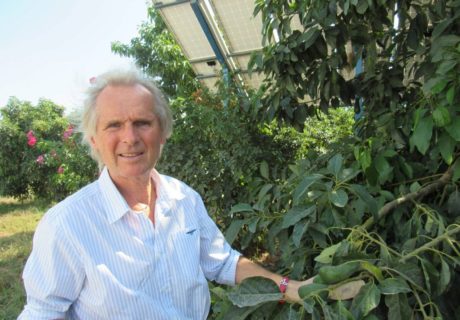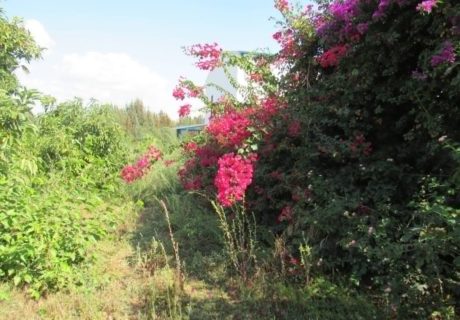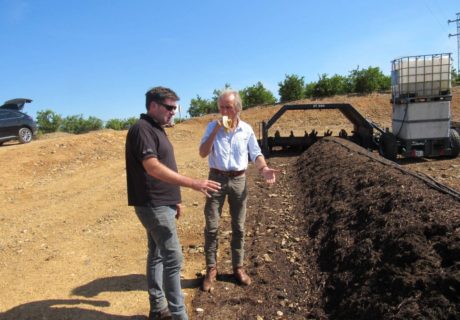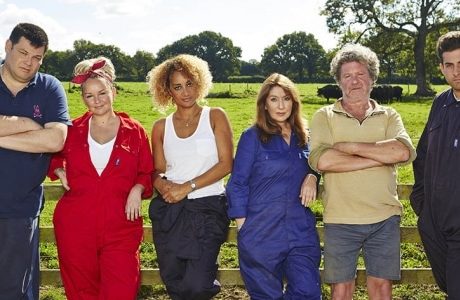German organic produce specialist Freddy Lehmann has seen production and profits grow on his Spanish farms since he embraced permaculture techniques. Michael Wale has been to visit the farms to find out more
I was awoken just after seven-o-clock on a cloudless Spanish morning by a burst of classical music on Freddy Lehmann’s farm. The music being all part of linking up permaculture to his deeply held organic beliefs.
Seventy year old Lehmann runs the family German-based firm Lehmann-natur that specialises in wholesaling organic fruit and vegetables in Europe, and helps similarly minded people across the world to join up providing them with product.
Lehmann-natur haven’t always thought this way. When Freddy Lehmann started work with the company it dealt only in the conventionally produced food market. However he was to change all that explaining : “ My good feeling was gone. We started again. People said that I was crazy and there was no future in what I was about to do. But I could feel there was a reason.”
Later he was persuaded by a friend to buy an organic farm, which led later to a second in Spain, which was where I spent a night in a simple bungalow style building, and where Lehmann shares his time between his offices in Monchengladbach and his home in Dusseldorf. Back home he is crowdfunding a new organic centre backed by Triodos bank, where there will be a logistics centre for fruit, and a new school plus an education centre, to encourage young people to find out more about organic food.
The man who influenced him to add permaculture to his organic production of fruit in Spain was Sepp Holzer. Holzer is Austrian and his knowledge is based upon his own practical work. Lehmann recalls : “He came to my farm, and I learned a lot from him. It has improved the profit. In business we have to make a profit but we don’t calculate the external cost. In Germany we said for years that nuclear energy was the cheapest in the world. But it’s the most expensive in the world”!
As he drove me the hour and quarter to his first farm in the Hueva region of Andalucia from Fara airport in Portugal, he pointed at the conventionally farmed orange groves on both sides of the road, noting that there was not a weed to be seen between the rows of trees.
“They just pour on gallons of pesticide. It poisons the soil. Chemical inputs destroy the natural system”
“ They just pour on gallons of pesticide. It poisons the soil. They have cut the orange trees right down. They are ill. The sun bakes the soil, because there is nothing left to protect it. Chemical inputs destroy the natural system”.
So when you get to his first farm what really makes him proud are the long rows, several feet high, of friable, black earth. This is the nature supporting compost, carefully produced, which is also part of the permaculture programme he has introduced.
His black gold is sourced partly by buying in sheep droppings from a farm high up on the nearby hills.Ground stone and weeds. These are cut as winter approaches, but not before, from between the rows of fruit trees and then composted with the other ingredients. The results become water retaining mulch around each plant.
On the farm ,where I stayed, there was another major introduction through permaculture ,which Lehmann says is a lot about topography. He calls it The Curve. Because the farm is not many miles from the sea it was found that when the fruit trees were planted in conventional straight lines the wind would whip straight through them, as well as causing the loss of scarce water.
The Curve is everything it says it is. New trees are now planted in curved lines with the earth banked up on both sides, leaving weeds free to grow in between the rows. Pomegranate, orange, limes, almonds and avocados are grown often one after the other in no particular order. He is about to plant a huge number of lemons, and you are just as likely to come across a clump of flowers as a fruit tree in any of the curves to encourage the presence of pollinators. Water use is down by 30%.
Lehmann’s company has an annual turnover of 150 million euros. Since the introduction of permaculture the 300 tons of fruit produced by the two comparatively small farms has increased to 500 tons with a forecast for 800 tons soon, and 2,000 tons in the next three to four years. Meanwhile his first farm will be enlarging from its 160 hectares. On the second farm there is a small packing house all done by hand by local people, where the fruit is sorted into three types, all for sale. Nothing is wasted. Germany is the main destination but there is solid demand from Denmark.
“The best system for us is to work like partners – whether they’re in Germany, Spain, Italy, Argentina or Peru. The best way for us is to give our ideas and knowledge about what we do here”
It is the growing demand across Europe that is causing Lehmann to create new suppliers and, more importantly, organic growing areas across the world. Lehmann says : “ We get organic bananas from Dominica. In some farms we have money, we do give development money. The best system for us is to work like partners – whether they’re in Germany, Spain, Italy, Argentina or Peru. The best way for us is to give our ideas and knowledge about what we do here. We guarantee them a price for their produce, but do not demand they only sell to us. They also come here once or twice a year. Next week we have a group coming from Egypt who want to produce potatoes”.
As for the classical music that wafted through my bedroom window – what was that all about? Lehmann smiles. “ It’s an experiment, but it seems to make the trees around here happy, and that is what we want. Look at what we’re doing we’re destroying the Planet. We have to change that. It’s so important”.
Photos: Michael Wale







